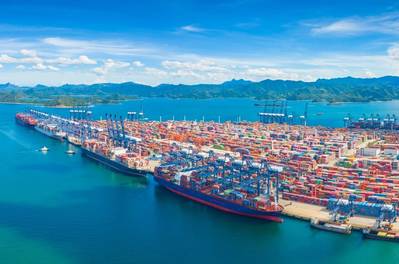Delays Threaten New Disruptions in Global Trade
COVID-19 restrictions, which have complicated major ports in the U.S. and Europe through the pandemic, are now disrupting operations at a key export hub in China that could last until the end of this month and lead to further rise in ocean freight rates.
Recent Set Backs
Capacity at major ports is being pushed to the limit by tighter coronavirus controls in China’s southern manufacturing hub. Operations have slowed as authorities restrict business activity in the efforts to halt COVID-19 outbreaks.
The present COVID-19 crisis has resulted in Guangdong province taking tighter controls, as mass testing in the regional capital of Guangzhou reveals more  cases of the Delta variant of the virus. The eruption of cases has caused serious delays at normally highly efficient South China ports—Yantian, Shekou and Nansha.
cases of the Delta variant of the virus. The eruption of cases has caused serious delays at normally highly efficient South China ports—Yantian, Shekou and Nansha.
The restrictions have particularly impacted operations at Yantian International Container Terminals, an operator of terminals at Shenzhen port. The port was partially closed in late May for a few days after some dockworkers were among those confirmed with Covid-19 amid the outbreak in Guangdong Province. The facility is facing challenges due to efforts by the local authorities to disinfect and enforce quarantine measures, which has led to labor shortages.
Extended Delays
Analysts and industry stakeholders do not anticipate a swift resolution to the port congestion or container availability issues at ports in southern China.
In a recent advisory, Maersk stated, “After a six-day stop on export containers, the Yantian Port Authorities have announced that productivity is gradually set to increase as more workers return and more berths reopen.”
While this has a positive impact on gate activity, which is soon expected to reach the same levels as before the incident, schedule reliability will continue to suffer with an average waiting time of 16 days and counting.
Vincent Clerc, AP Moller-Maersk’s CEO of Ocean & Logistics, stated: “I would say this for us is a much bigger disruption than the Ever Given getting stuck in the Suez Canal for some days because of the duration and the importance of Yantian as a gateway.”
The blockage of the Suez Canal only lasted for six days, while the situation in Yantian has already lasted several weeks with no end in sight for the coming weeks either. Yantian is a key gateway port on a global scale.
Significant Ripple Effects
Charter rates for containerships are at record levels due to an almost complete lack of available tonnage. The lengthy delays in vessels schedules will see lines such as Maersk being forced to cut sailings due to reduced available capacity.
“We will see lost sailings as a result of these delays which will only compound the congestion that we’re seeing,” Clerc stated.
The Yantian port delays are bound to have significant ripple effects. Many in the industry are working hard to redirect cargo to other ports in the Pearl River Delta region, which comes with its own challenges such as equipment shortages and significant berthing delays.
How SiShips Can Help
The challenges at Yantian are the latest in a saga of global container shipping issues that have plagued shippers, forwarders and carriers for more than a year — from port congestion, to container shortages, to Covid-19 complications, to the Suez Canal blockage.
With shipping demands at an all-time high, it is critical to choose the best possible company for your shipping needs. Sheltered International can ensure the quickest and most reliable options for your company. With so many unforeseen factors impacting freight rates, it can be difficult to know if you’re getting the best price. With SiShips software, you can get instant access to quote options.

